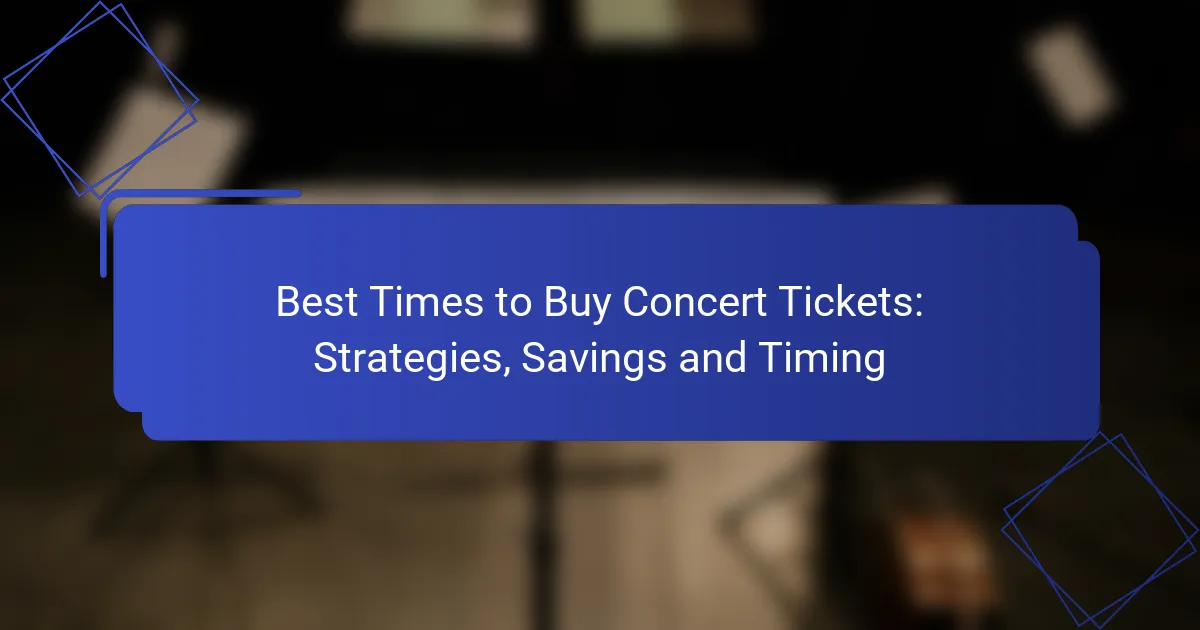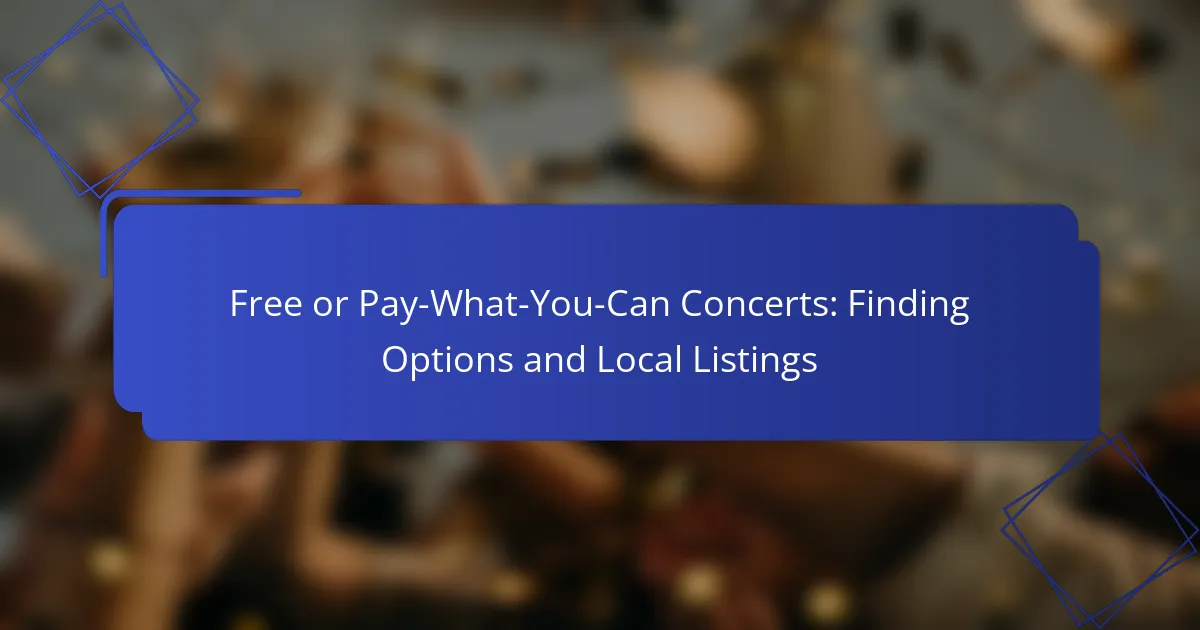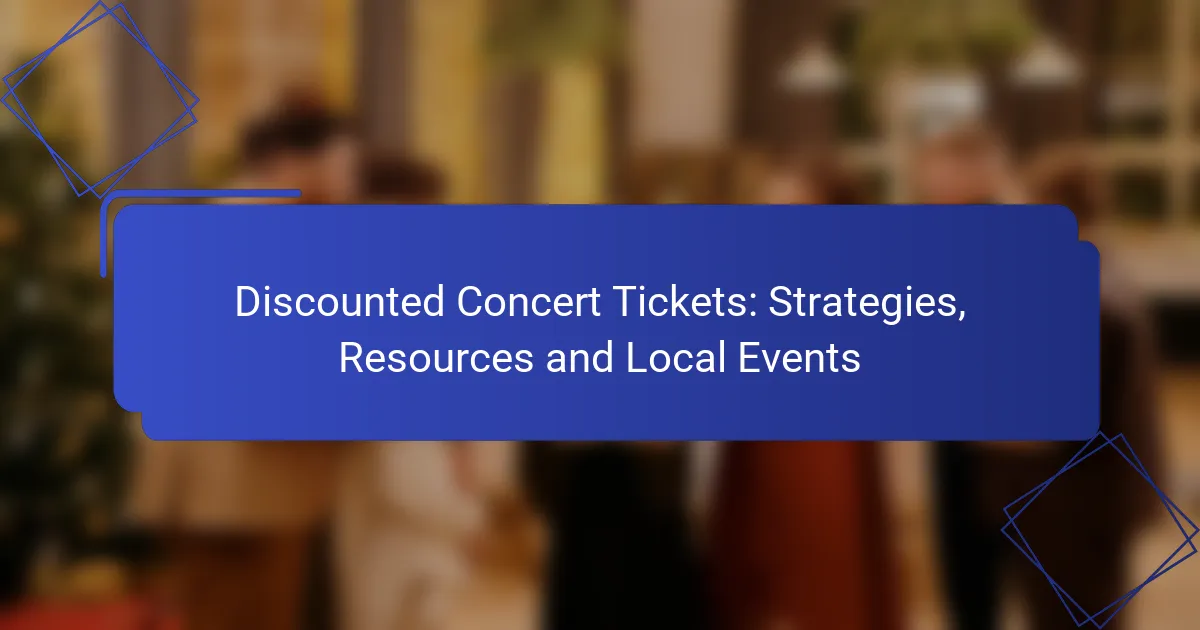Finding the best time to buy concert tickets can lead to substantial savings and a better overall experience. By taking advantage of pre-sale opportunities and exploring last-minute deals, you can secure tickets at lower prices. Additionally, utilizing online tools and insider tips can enhance your chances of snagging the best offers, especially in high-demand markets.

When is the best time to buy concert tickets in the US?
The best time to buy concert tickets in the US often depends on the type of event and the demand surrounding it. Generally, purchasing tickets during pre-sale periods or looking for last-minute deals can yield significant savings.
Pre-sale periods
Pre-sale periods are specific windows of time when tickets are available to select groups, such as fan club members or credit card holders. These sales typically occur before the general public release and can offer better prices and seat selections.
To take advantage of pre-sales, sign up for artist newsletters or fan clubs and monitor credit card promotions. It’s common for pre-sale tickets to sell out quickly, so act fast once they become available.
Last-minute deals
Last-minute deals can provide substantial savings for those willing to wait until closer to the concert date. Ticket prices may drop significantly as the event approaches, especially if the venue has not sold out.
However, this strategy carries risks, as popular shows may sell out entirely. If you opt for this approach, keep an eye on ticket resale platforms and be ready to purchase as soon as you see a good deal.
Seasonal trends
Seasonal trends can influence ticket prices and availability. Concerts during peak seasons, such as summer or major holidays, often see higher demand and prices. Conversely, shows during off-peak times may offer lower prices and better availability.
To maximize savings, consider attending concerts during weekdays or in the off-season. Researching the typical concert calendar for your favorite artists can help you identify the best times to buy tickets.
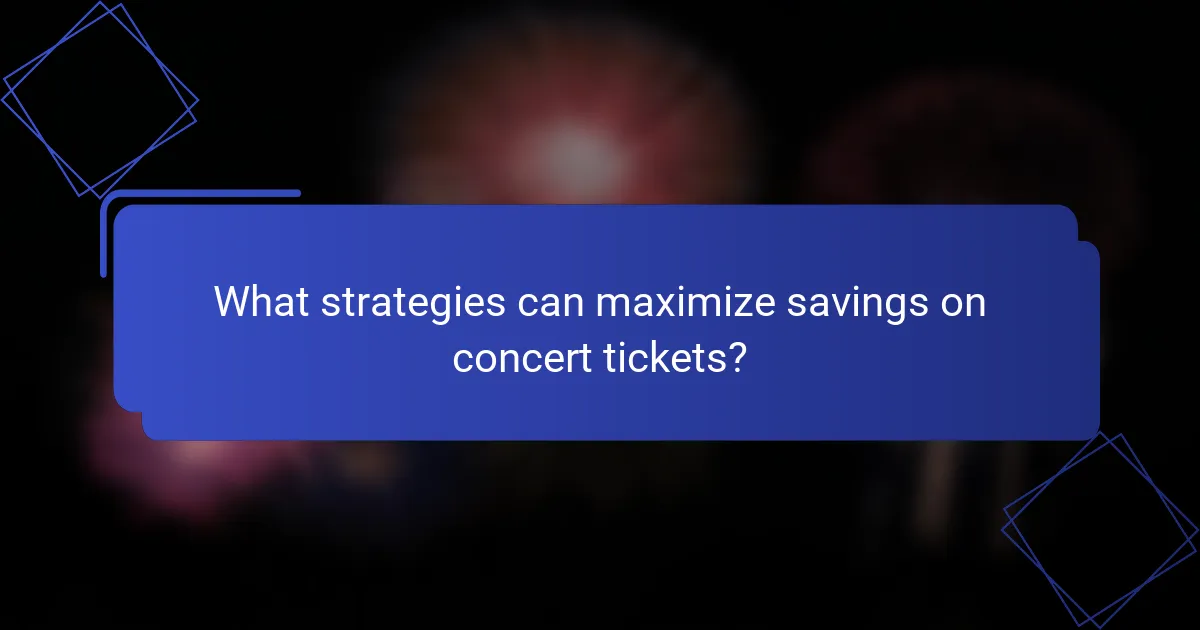
What strategies can maximize savings on concert tickets?
To maximize savings on concert tickets, utilize a combination of online tools and insider knowledge. Employing ticket comparison websites, setting price alerts, and joining fan clubs can significantly reduce costs and enhance your chances of securing the best deals.
Using ticket comparison websites
Ticket comparison websites aggregate prices from various vendors, allowing you to see the best available options at a glance. Popular sites like Ticketmaster, SeatGeek, and Vivid Seats can help you find lower prices by comparing multiple sellers.
When using these platforms, be aware of additional fees that may apply at checkout. Always check the total cost, including service charges, to ensure you’re getting the best deal possible.
Setting price alerts
Setting price alerts is a proactive way to monitor ticket prices for specific concerts. Many ticketing platforms offer this feature, notifying you when prices drop or reach a set threshold.
To effectively use price alerts, choose a reasonable price point based on your budget and the average ticket costs for similar events. This way, you can act quickly when a good deal becomes available.
Joining fan clubs for exclusive offers
Joining fan clubs can provide access to exclusive ticket presales and discounts. Many artists and venues offer membership programs that include perks like early access to tickets or reduced prices for loyal fans.
Consider the cost of membership against the potential savings. If you frequently attend concerts of a particular artist or venue, the investment may pay off quickly through discounted tickets and exclusive offers.
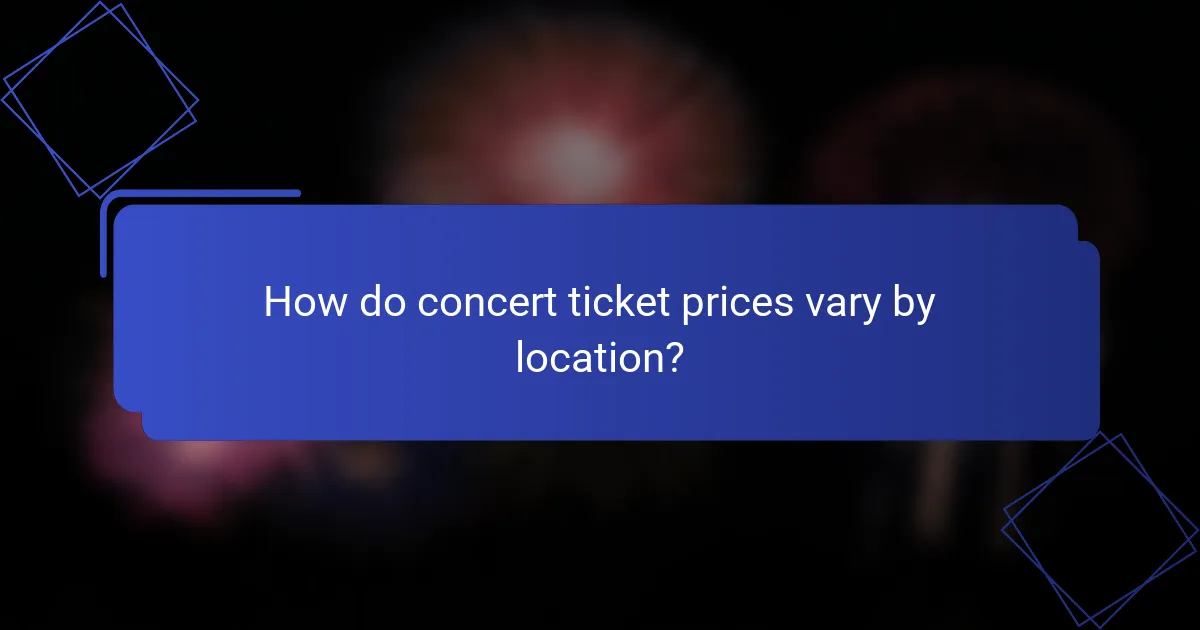
How do concert ticket prices vary by location?
Concert ticket prices can significantly differ based on location due to factors like local demand, venue capacity, and regional economic conditions. Major cities often see higher prices compared to smaller towns, reflecting the cost of living and audience size.
Price differences in major cities
In major cities such as New York, Los Angeles, and London, concert ticket prices can be substantially higher, often ranging from 20% to 50% more than in smaller markets. This increase is driven by higher operational costs for venues and the larger population of potential attendees.
For example, a popular artist’s concert in New York might see tickets priced between $100 and $300, while the same concert in a smaller city could range from $60 to $150. The competition for tickets in urban areas can also lead to price surges as demand increases.
Regional demand impacts
Regional demand plays a crucial role in determining ticket prices. Areas with a vibrant music scene or a high concentration of fans for a particular genre may experience elevated prices due to increased competition for limited seats. Conversely, regions with less demand may offer lower prices to attract attendees.
For instance, a concert in a city known for its music festivals might see ticket prices rise as fans are eager to attend, while a similar event in a less popular location may struggle to sell out, leading to discounts or promotions. Monitoring local trends and artist popularity can help buyers identify the best times to purchase tickets at reasonable prices.
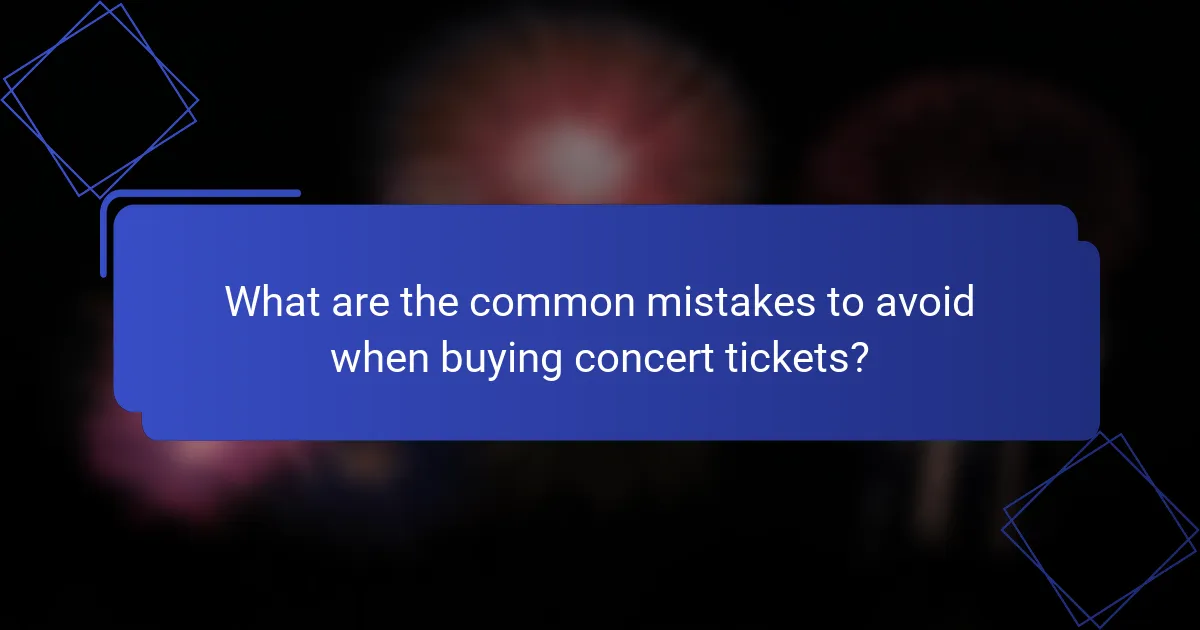
What are the common mistakes to avoid when buying concert tickets?
Common mistakes when buying concert tickets include purchasing from unofficial sources and overlooking additional fees. Avoiding these pitfalls can save you money and ensure a smoother ticket-buying experience.
Buying from unofficial resellers
Purchasing tickets from unofficial resellers can lead to inflated prices and potential scams. These sellers often charge significantly more than the original ticket price, sometimes exceeding 50% above face value.
To avoid this mistake, always buy tickets from authorized sellers or the venue’s official website. If you must use a resale platform, check for buyer protections and verify the seller’s reputation.
Ignoring fees and extra costs
Many buyers overlook the additional fees that can significantly increase the total cost of concert tickets. These fees may include service charges, delivery fees, and processing fees, which can add up to 20-30% of the ticket price.
To avoid surprises, review the final price before completing your purchase. Look for a breakdown of costs and consider comparing different platforms to find the best overall deal, including all fees.
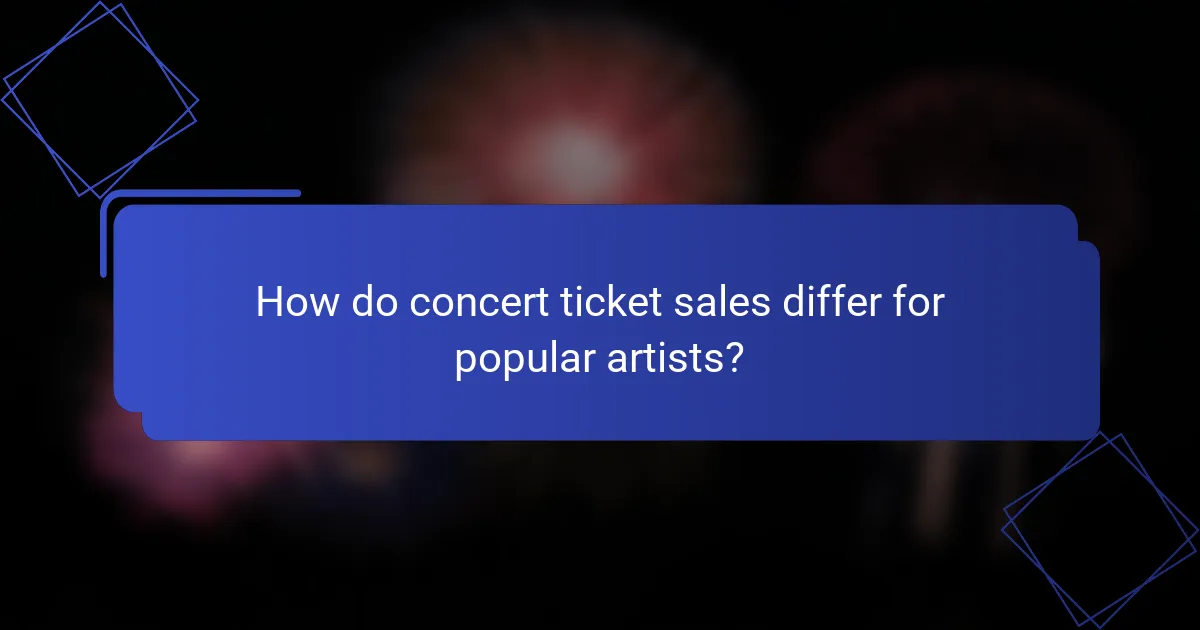
How do concert ticket sales differ for popular artists?
Concert ticket sales for popular artists often experience higher demand and faster sell-outs compared to lesser-known performers. Factors such as fan base size, media exposure, and marketing strategies significantly influence these sales dynamics.
High demand for top artists
Top artists typically see a surge in ticket demand, leading to quick sell-outs and inflated prices on secondary markets. Fans often need to act fast, sometimes purchasing tickets within minutes of release to secure their spot. For instance, major acts like Taylor Swift or Ed Sheeran can sell out entire stadiums in just a few minutes.
To navigate this high demand, fans should set reminders for ticket release dates, use official ticketing platforms, and consider joining fan clubs for early access. It’s also wise to have multiple payment methods ready to expedite the checkout process.
Impact of celebrity endorsements
Celebrity endorsements can significantly boost ticket sales for concerts, as they attract attention and lend credibility to events. When a well-known artist promotes a show or collaborates with another act, it can lead to increased interest and ticket purchases.
For example, if a popular artist announces a surprise guest appearance or a collaboration with a trending musician, ticket sales may spike dramatically. Fans should pay attention to social media announcements and promotional campaigns, as these can indicate potential sell-out shows and opportunities for savings through early purchases.
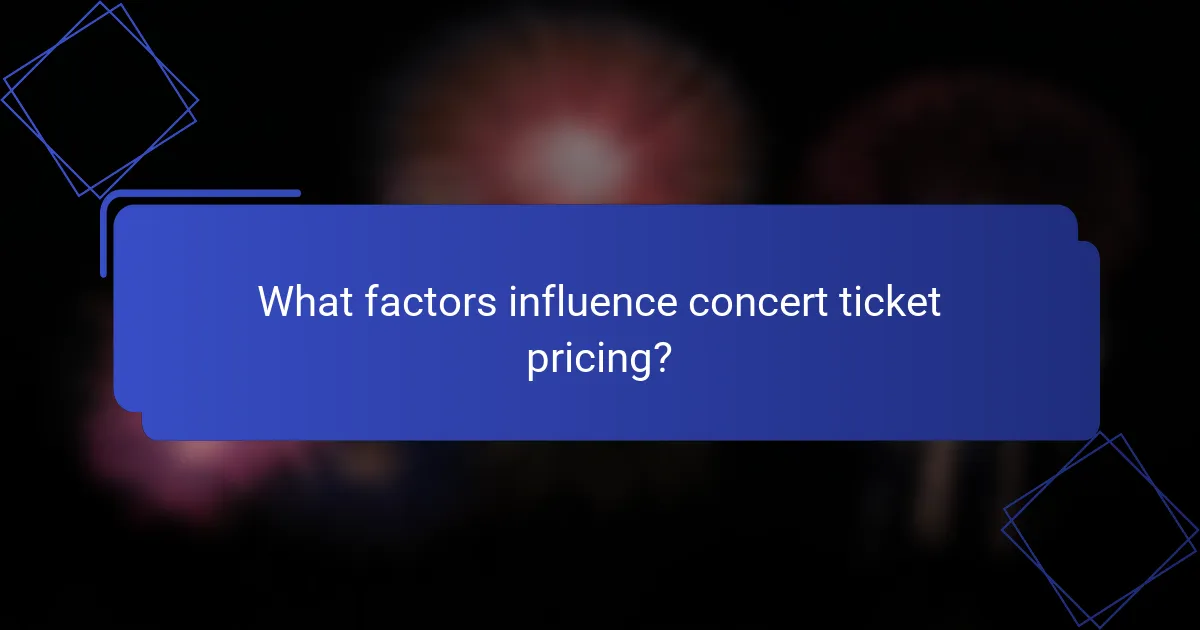
What factors influence concert ticket pricing?
Concert ticket pricing is influenced by several key factors, including venue size, location, artist popularity, and the timing of the tour. Understanding these elements can help buyers make informed decisions and potentially save money.
Venue size and location
The size and location of a venue significantly affect ticket prices. Larger venues in major cities typically charge more due to higher demand and operational costs. For example, tickets for concerts in stadiums often range from $50 to $300, while smaller venues may offer tickets from $20 to $100.
Additionally, geographical location plays a role; concerts in metropolitan areas usually have higher prices compared to those in rural settings. Buyers should consider traveling to nearby cities for potentially lower ticket prices.
Artist popularity and tour schedule
Artist popularity is a major determinant of ticket pricing. Well-known artists or bands can command higher prices, especially during peak tour seasons. For instance, tickets for top-tier artists can start at $100 and go well over $500 for premium seats.
The timing of the tour also impacts pricing. Tickets released during presales or early bird sales may be cheaper than those sold closer to the concert date. Fans should monitor ticket sales and consider purchasing early to secure better prices.
